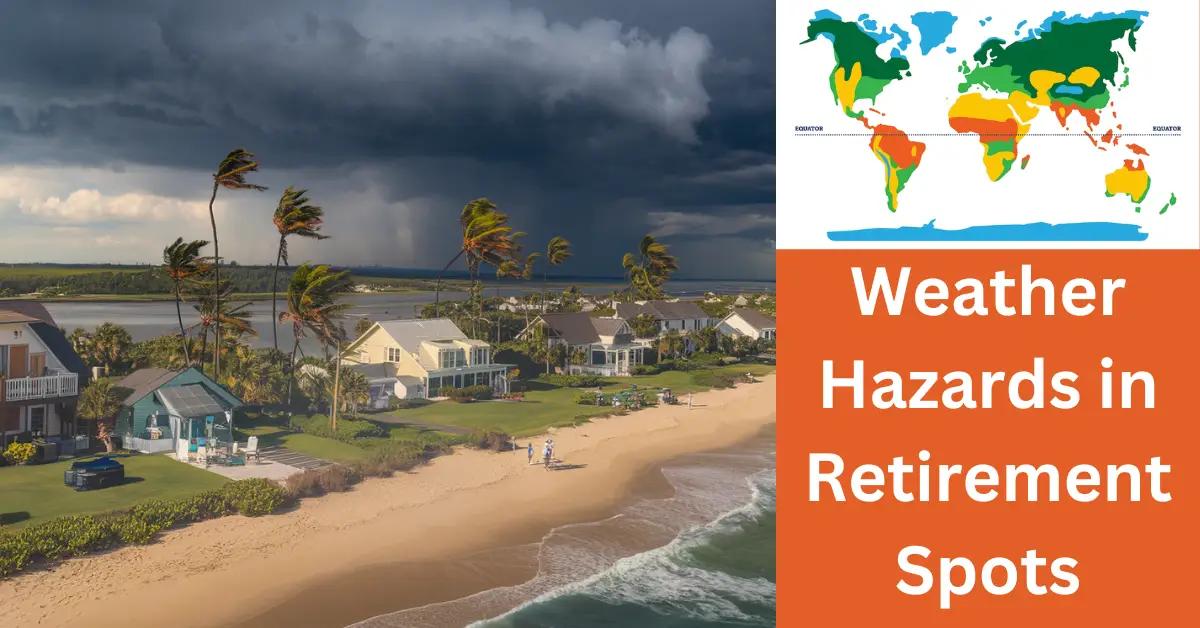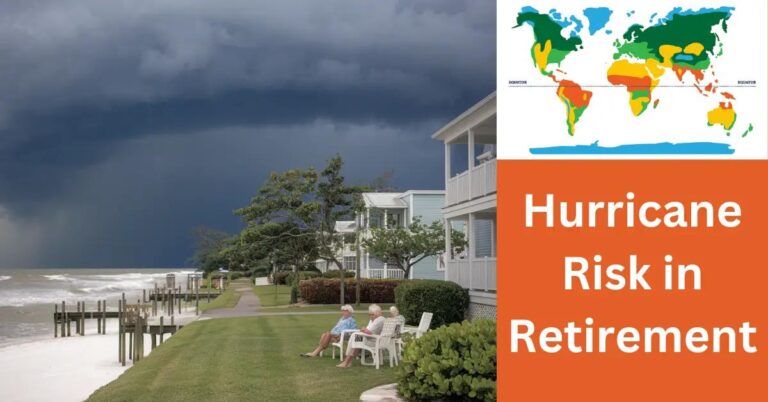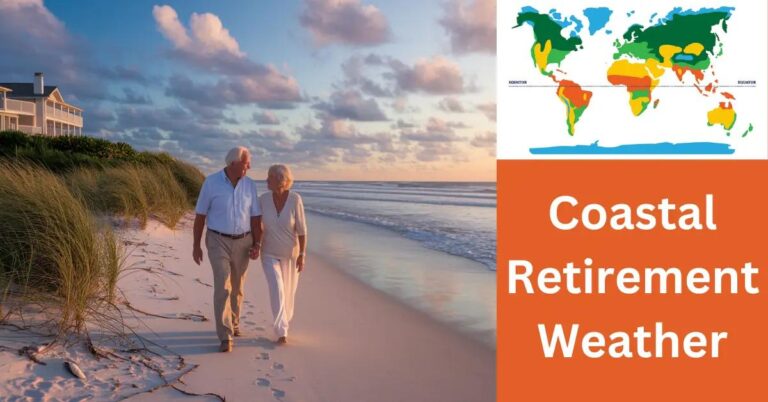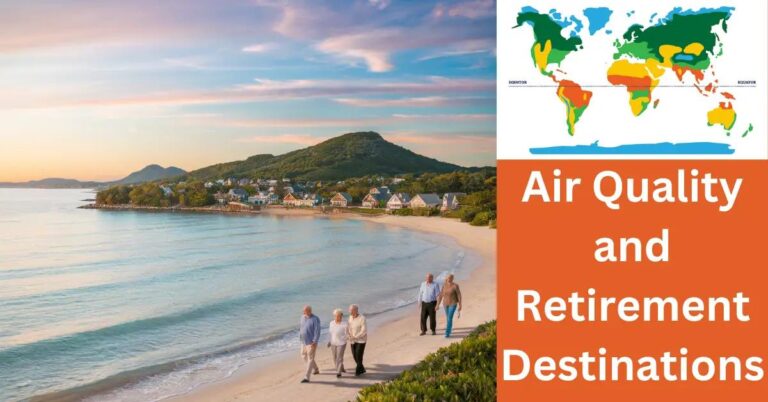TL;DR:
- Weather hazards impact retirement choices; consider locations with fewer natural disasters.
- Inland areas away from coastlines are typically safer from hurricanes and flooding.
- Climate affects daily living costs, e.g., heating or air conditioning.
- Avoid low-lying coastal areas; rising sea levels pose a future threat.
- Tornadoes are a risk in the Midwest; stay prepared with safety plans.
- Wildfires are a concern in dry regions like California.
- Prepare for severe weather with emergency plans and robust insurance.
- Areas with stable, mild climates like Arizona and New Mexico offer less humidity; California offers diverse climates but may be costly.
- Texas provides a moderate climate with tax benefits.
- Climate change impacts warmer retirement spots; strong community support is crucial.
Are weather hazards a deal-breaker for your retirement plans? With retirees often seeking sun and sea, understanding climate risks in popular retirement spots is vital. I’ll guide you through the stormy truths of coastal retirements and show you how extreme weather can reshape your golden years. Whether it's hurricane risks or tornado zones, knowing what lies ahead could redefine where and how you choose to enjoy your retirement journey.
How Do Weather Hazards Impact Retirement Destination Choices?
When deciding where to retire, we should think about weather risks. Some places have high risks of natural disasters like hurricanes or floods. These weather hazards can wreck houses and disturb our lives. So, picking a place with less risk is wise.
Where is the best place to retire to avoid climate change? Locations with fewer extreme weather events are best. Areas inland and away from coastlines can be safer. They typically have less risk of hurricanes and flooding. Check out places with stable weather patterns and less risk of climate change impacts.
The climate of a retirement spot affects daily life. Hot summers, cold winters, or frequent storms can make living hard. For example, high heat might lead to more air conditioning costs. Snow in winter might require extra heating or snow removal.
Retirement in coastal communities might face hurricane hazards. These storms can cause flooding and wind damage. Picking a retirement place with fewer coastal risks can help avoid these issues.
Choosing a spot with stable weather can make retirement more pleasant. Rising sea levels may threaten low-lying areas. So, retirement communities on higher ground might be safer.
Geography plays a role in weather safety. Mountains may block rain or storms. Forests can help protect from strong winds. Understanding these features helps us find safer retirement spots.
Therefore, when picking a retirement place, consider both today's weather and future climate changes. Remember that the best retirement spot has not just pleasant weather but also fewer natural threats. Looking at areas with mild, stable weather aids in finding the perfect retirement destination.
What are the specific weather risks faced by retirees?
When thinking about where to retire, it's important to consider weather hazards. Weather can change the safety and comfort of your chosen spot.
Coastal Hazards
Many retirees love living near the ocean. But, coastal areas come with hurricane and tropical storm threats. These storms bring strong winds and flooding. Floods can damage homes and roads, making daily life hard.
Flood Risks
Floods are not just a problem near the ocean. Heavy rain can lead to floods in many places. Some retirement spots, especially those below sea level, have higher flood risks. Retirees should know if their spot is prone to floods and prepare. It is wise to have a flood plan.
Tornado Zones
Tornadoes can turn a peaceful day into a frightening one in minutes. They are fast and can destroy homes quickly. Some retirement communities, especially in the Midwest, face higher tornado risks. Retirees in these areas should have safety plans in place.
Wildfire Risks
In places like California, wildfires are a big concern. Dry weather causes forests to catch fire easily. Homes near these forests can be in danger. Smoke from fires can affect air quality and make breathing hard, especially for seniors.
Choosing Safe Areas
When choosing where to settle, retirees should consider these weather risks. Some warm places near water are safer from storms. It's important to choose areas with good safety measures and emergency plans.
Understanding these weather risks helps us make better retirement choices. By being informed, I can ensure a safer and happier retirement.
How Can Retirees Prepare for Severe Weather Events?
When choosing a retirement spot, weather concerns can play a big part in the decision. To prepare for severe weather, having a plan is key. Living in areas prone to hurricanes? Consider specific strategies to stay safe.
Hurricane preparedness starts with gathering emergency supplies. Stock up on water, non-perishable food, and first-aid kits. Secure your home by installing storm shutters and reinforcing garage doors. These safeguards help protect against powerful winds and heavy rains. Don’t forget to plan evacuation routes too.
Insurance is another important step to consider. Weather hazards can cause expensive damage. Meet with your insurance agent to discuss options. Make sure you have robust coverage for hurricanes and floods. Know what your policy covers and update it regularly.
What should you do when the weather turns bad? Develop a clear severe weather safety plan. A detailed plan increases safety for you and your home. Identify a safe room or area where family members can gather. Keep a battery-powered radio handy for the latest alerts.
When is the best time to think about these preparations? The answer is now. Planning ahead of time beats last-minute rushing before a storm hits. Think about areas with favorable weather. The best places to retire consider both weather and taxes. Often, warm places with good weather are budget-friendly too.
By planning, you build peace of mind no matter the forecast. Retirees can enjoy life in their chosen spots while staying weather-ready. Planning, insurance, and safety plans make all the difference during severe weather. To learn more about specific preparedness needs or find insurance options, research online or speak with local experts.
Which Retirement Areas Offer the Best Weather for Seniors?
Looking for the perfect retirement spot often means finding the best weather. A stable climate is key. Dry conditions are crucial. So, where is the best place to retire with no humidity? For this, I recommend the southwestern U.S. States like Arizona and New Mexico offer low humidity. They provide dry air and pleasant winters. Arizona's climate is notably low-humidity.
But what state has the best weather for retirement? California offers a diverse climate. You find sunny beaches and cool mountain air nearby. San Diego, for instance, enjoys mild temperatures year-round. Its climate stability makes it a safe retirement location. However, living costs there might rise. Other states, like Florida, have warm weather but come with humidity and hurricanes.
Let's discuss cost-effectiveness. Texas stands out. Cities like Austin have a moderate, pleasant climate. They offer affordable, safe retirement areas. Texas avoids many extreme weather events found in the Gulf Coast areas. Tax benefits further add to its appeal.
Comparing these choices, your decision depends on personal needs. If humidity is a major concern, head to Arizona or New Mexico. Seeking a diverse climate? California may be your friend. If budget is top of the list, Texas provides a compelling choice.
Considering climate risks is also wise. While some areas are safe, others face wild weather. Wildfires in California, hurricanes in Florida—these are crucial factors. It's important to choose a place where these dangers are minimal or absent. Assessing retirement locations means balancing weather joy against extreme events and costs. Find more details on optimal retirement areas in various retirement location guides. Being well-informed ensures a comfortable, safe, and fulfilling retired life.
How Does Climate Change Affect Popular Retirement Spots?
Many retirees dream of sunny, warm places, but climate change effects on popular retirement spots are concerning. This issue affects our choices because rising temperatures and unpredictable weather events disrupt the relaxation we seek. For instance, Florida and Texas, popular retirement spots, face increasing hurricane threats, causing potential damage and disruptions.
Climate adaptation for retirees is essential. Are you considering moving to a warmer locale? First, check how the spot handles extreme heat or flooding. Do they have strong defenses or systems in place? Cities like Miami have flood barriers and drainage systems, which help manage water surges.
Thinking of relocating? Use these weather-related relocation tips. First, research the area's previous weather patterns and response strategies. Next, ask about community support during emergencies. Communities with organized support systems manage better in crises.
Retirees also wonder about the best warm place to retire in the world. Consider spots with firm, long-term climate plans. Countries like Portugal and Spain have developed solid strategies to adapt to climate shifts. They offer beautiful weather and safety plans, ideal for retirees.
Some might say certain spots are freezing cold, expensive, and the best. However, choose a place that balances comfort and safety. Look into areas with moderate climates and affordable living options.
In essence, thinking ahead about climate adaptation strategies can safeguard our dream retirement. Consider practical relocation benefits as you plan this next life chapter. Clear knowledge helps us make sound decisions and embrace retirement with less worry about unpredictable weather. Taking these steps ensures a relaxed, enjoyable lifestyle, just as we envisioned.
Conclusion
Choosing the right place to retire means understanding how weather affects your plans. Coastal areas can face hurricanes and floods, while some inland spots risk tornadoes. To be ready, plan for weather events and pick an area that's safe. Look for places with stable, mild weather and budget-friendly living. Keep in mind how climate change might impact your choice. Consider these factors carefully, and you'll enjoy a comfortable, stress-free retirement. Your perfect retirement spot is one that's safe, secure, and suits your lifestyle preferences.












